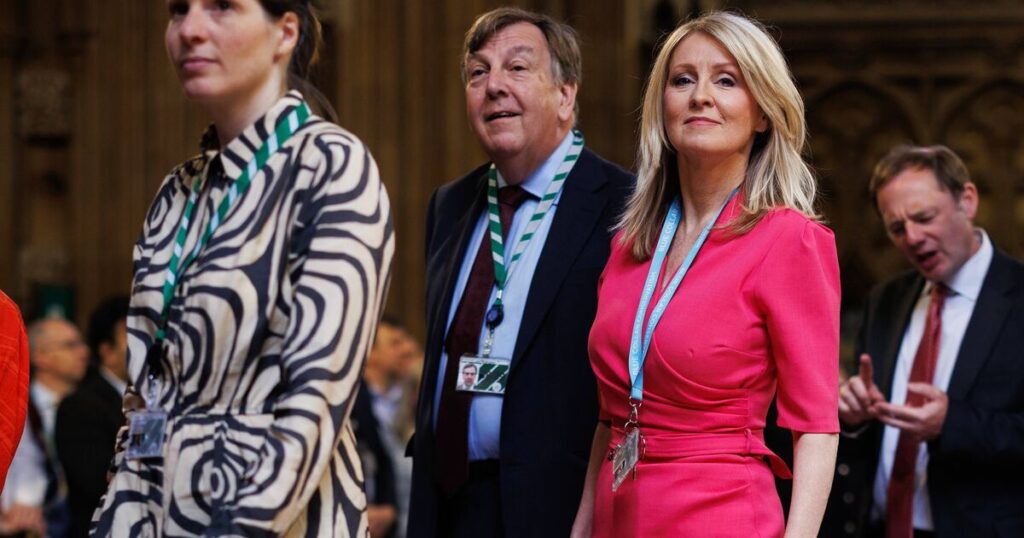

Conservative MP Esther McVey questioned the legality of the proposals (Image: Dan Kitwood, Getty Images)
Prime Minister Sir Keir Starmer is steeling himself for a potential rebellion during a crucial vote on his Government’s welfare reforms, despite marking his first year in office. A group of 39 Labour MPs have signalled their intention to oppose the benefits system overhaul on Tuesday evening, although this figure falls short of the 83 required to defeat the Prime Minister’s working majority.
Yet, it is anticipated that more MPs may join the dissenters in what could become Sir Keir’s biggest backbench revolt to date. In the run-up to the critical parliamentary battle, the Prime Minister has expressed a “real sense of pride and achievement” at a meeting with top ministers as the July 5 anniversary of his inaugural year approaches.
Sir Keir has lauded his administration’s efforts in giving working people the opportunity to prosper, not merely get by, as relayed by a No 10 spokesperson during a Cabinet briefing. Downing Street has highlighted accomplishments such as trade agreements, economic expansion, substantial long-term spending review investments, and reductions in NHS waiting times as part of the Government’s one-year track record.
The No 10 spokesman further stated: “(The Prime Minister) said the Government’s work is all designed and focused on improving the lives of working people and giving them the chance to thrive, not just survive, and the Government should be proud of those achievements as a team.”
Cabinet ministers, including Sir Keir himself, were reportedly engaged in a concerted effort to dissuade Labour MPs from joining the ranks of the rebels before the pivotal Commons debate. In a bid to quell potential insurrection within their own party, ministers are banking on a partial reversal of the controversial benefit cuts, aimed at safeguarding current recipients of personal independence payments (Pip) and the health component of universal credit, to appease the dissenters.
As the Universal Credit and Personal Independence Payment Bill underwent its second reading in the Commons, Work and Pensions Secretary Liz Kendall underscored the necessity for welfare reform to guarantee its future viability.
“I do not believe that this is sustainable if we want a welfare state that protects people who most need our help for generations to come,” declared the senior minister.
She added: “There is no responsibility in leaving our system of social security to continue as it is, and risk support for it becoming so frayed that it is no longer there to provide a safety net for those who can never work, and who most need our help and support.”

Work and Pensions Secretary Liz Kendall (Image: Anadolu via Getty Images)
In an attempt to stave off a potentially larger revolt by around 126 Labour MPs, spearheaded by Treasury Committee chairwoman Dame Meg Hillier, the Government last week mitigated the severity of its proposed changes. This move was designed to shield some 370,000 existing Pip beneficiaries who were at risk of losing benefits upon reassessment.
Ministers have pledged to a review of the system, which will include input from disabled individuals and be spearheaded by disabilities minister Sir Stephen Timms, alongside maintaining the higher universal credit rate for current claimants of the health-related element. Following this reversal, the anticipated savings from the reforms are now projected to be less than half of the £5 billion initially expected by the Government.
In the Commons, Ms Kendall was cautioned that the Timms review might be published post-implementation of the reforms. She affirmed that any amendments arising from the review would be implemented “as soon as is practically possible via primary or secondary legislation”, despite Downing Street’s earlier refusal to ensure the completion of Sir Stephen’s review before the reforms take effect.
Downing Street also maintained that the Government’s analysis, which forecasts an additional 150,000 people falling into poverty by 2030 due to the welfare proposals, was “subject to uncertainty”. Conservative leader Kemi Badenoch criticised the Government’s approach, stating it was “driven not by principle but by panic”.
Highlighting the Conservatives’ opposition to the Government’s stance, Mrs Badenoch addressed the Commons: “By 2030, on this Government’s spending plans, we will hit £100 billion on health and disability benefits alone, that is more than what we spend on defence, and this should make everyone in this House stop and think, because this Bill does nothing to fix that problem, and that is why we cannot support it.”
She slammed the Bill as a “fudge”, adding: “A fundamental and serious programme to reform our welfare system is required, and this Bill is not it.”
Former Tory work and pensions secretary Esther McVey raised concerns over the legality of the Government’s Pip policy.
She asked: “Has the Government taken legal advice as to whether it is lawful to treat people with the same conditions, disabilities and circumstances differently within the benefits system? It is morally unacceptable, but does the minister believe it is lawful?”.

Prime Minister Sir Keir Starmer (Image: PA)
Work and Pensions Secretary Liz Kendall replied: “I would just remind (her) that her own party had different rules and different rates for people on existing, compared to new, benefits in future. That is something they did. Once again, members opposite seem to be railing at the very problems they caused.”
Rachael Maskell, spearheading the rebellion aiming to stop the Bill on Tuesday night, called on MPs to back her in the vote.
The York Central MP declared in the Commons: “These Dickensian cuts belong to a different era and a different party. They are far from what this Labour Party is for, a party to protect the poor, as is my purpose, for I am my brother’s keeper.”
Before the Commons debate, Ms Maskell hinted she expected “many more” Labour MPs than the 39 who had endorsed her “reasoned amendment” to join her in the revolt.
The chairwoman of the Commons Work and Pensions Committee lambasted the Universal Credit and Personal Independence Payment Bill, labelling it a “dog’s breakfast”.
Debbie Abrahams told the Commons: “I absolutely agree with (Work and Pensions Secretary Liz Kendall) about the need – and the general recognition I think is across this House – of the need to reform the social security system.”
The MP for Oldham East and Saddleworth later voiced concerns over the “clear confusion about the Pip (personal independence payment) review – will it be co-produced with disabled people and their organisations?”.
On the topic of the new criteria for Pip claimants, Ms Abrahams questioned: “If so, why are we saying that the outcome of that review and the new Pip assessment is pre-determined at four points?”.
She highlighted the core issue: “And therein lies the problem – most of us are aware that the dog’s breakfast of this Bill is being driven by the need to get four points to the OBR (Office for Budget Responsibility) to enable it to be scored for the budget.”
The Liberal Democrats’ work and pensions spokesman Steve Darling also took a stand in the Commons. Mr Darling condemned the Government’s welfare reforms as “un-British” and “unjust”, confirming his party’s support for Rachael Maskell’s reasoned amendment designed to block the Bill’s progression.
The Torbay MP expressed strong opposition: “This two-tier approach to this system is wrong, and I have, and the Liberal Democrats have, grave concerns that this is un-British, it’s unjust, and it is not the way of our world.”
He continued with a stark warning: “We’ve heard from the minister saying it’s been done before, but that doesn’t make it right. That doesn’t make it right. It is almost Orwellian that we will be having a system where in our law we say that all disabled people are equal, but some are more equal than others.”
Further, he condemned Treasury minister Darren Jones’ remarks on personal independence payments (Pip) as “utterly shameful” and criticised the hasty progression of the Bill as “equally shameful the way this Bill is being dashed through”.
Regarding potential consequences for dissenting Labour MPs, Business Secretary Jonathan Reynolds stated to the media he was “not aware” of any plans to withdraw the party whip, but noted “those issues are for the chief whip”.
Meanwhile, Andy Burnham, the Labour Mayor of Greater Manchester and a critic of the Bill, lambasted the parliamentary process it faces, arguing it is fundamentally flawed.
On social media platform X, Burnham posted his disapproval: “Third Reading in eight days? A timetable like that diminishes the role of MPs in getting this legislation right, shuts out disabled people and puts too many at risk.”
 Latest World Breaking News Online News Portal
Latest World Breaking News Online News Portal






